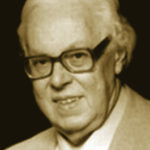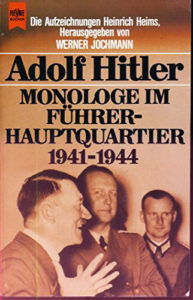 Picker (pic left) pointed out in the introduction to the edition of his Table Talk that, apart from short walks, Hitler ‘only found the necessary mental and spiritual relaxation in private conversation at his table, i.e. in talking in a personal, convivial atmosphere’.[1] This purpose was best achieved the further the respective topic of conversation led away from the pressing tasks and decisions of the day. Since every effort and concentration was to be avoided, the guests refrained from deepening or continuing a topic by asking questions or raising objections. In addition, the commander-in-chief, who was cut off from many contacts and isolated from the people in his headquarters, also monologued to gain clarity for himself. He found it particularly helpful when the guests were open-minded and joined in. During the war, the small dinner party replaced the population, whose response Hitler had always so urgently needed for his decisions and whom he could not entirely do without.
Picker (pic left) pointed out in the introduction to the edition of his Table Talk that, apart from short walks, Hitler ‘only found the necessary mental and spiritual relaxation in private conversation at his table, i.e. in talking in a personal, convivial atmosphere’.[1] This purpose was best achieved the further the respective topic of conversation led away from the pressing tasks and decisions of the day. Since every effort and concentration was to be avoided, the guests refrained from deepening or continuing a topic by asking questions or raising objections. In addition, the commander-in-chief, who was cut off from many contacts and isolated from the people in his headquarters, also monologued to gain clarity for himself. He found it particularly helpful when the guests were open-minded and joined in. During the war, the small dinner party replaced the population, whose response Hitler had always so urgently needed for his decisions and whom he could not entirely do without.
The need for communication became even more obvious at the nightly teatimes. Hitler didn’t retire after the evening briefing to relax or reflect on current events, but invited a few confidants to his bunker, which also served him as a workroom, to shed the burden of the day and gain new energy. He attached particular importance to the presence of his secretaries, because he felt stimulated by this, but at the same time the informal atmosphere was preserved. Very different topics were often discussed than in the conversations in the larger circle.
______ 卐 ______
Editor’s Note: This is what those who do a detailed analysis of Mein Kampf fail to understand: the real Hitler is the one of his after-dinner talks. The other is the ‘PR Hitler’ for the masses.
______ 卐 ______
When assessing Hitler’s monologues, these aspects will always have to be taken into account. It corresponded to the need for relaxation and repression that in the winter months of 1941/42 the serious crisis on the Eastern Front, the hardships of the population in the increasingly severe war, the supply difficulties and the looming weakness of Italy weren’t mentioned at all. No less visible is the need for recreation in the reminiscences of a special past, the reports of interesting encounters and experiences, and discussions about questions of art. This is often matched by the style of relaxed chit-chat, whereby the topics changed quickly and easily and undoubtedly not every word and every opinion should be weighed on the gold scales.
Hitler sought contact with his aides and collaborators when fundamental questions of worldview and politics moved him and he wanted to gain clarity about his course of action, especially about the possibilities and limits he had for his actions during the war. The frequent discussions on questions of faith, the vitality of Christianity in Germany and Europe, the position of the churches on National Socialism and politics in the occupied territories of Eastern Europe belong in this context; and the same for his remarks on the administration of justice and the special problems of the penal system under the exceptional conditions of war. Hitler sensed in his conversations with the few people around him in the Führer’s headquarters that the readiness to take tougher and more uncompromising action against outsiders or enemies of the regime grew the more severe as the war unfolded, and the sacrifices it demanded. Even in the seclusion of his headquarters, he still had a feeling for the mood in the country and the state of consciousness of the individual groups and classes. Hence his repeated harsh criticism of the administration and its schematism, which was shared by parts of the population, his mockery of the concerns and objections of the experts in all areas of public life, and his anger at the Germans who showed fear and disgust given the deportations of Jews and the persecution measures in the occupied territories.
______ 卐 ______
Editor’s Note: This reminds me of American racialists that falter over the exterminationist measures that William Pierce fantasized about in both fiction and his story of the white race.
______ 卐 ______
Now, admittedly, the records convey only an inadequate picture of Hitler’s remarks. Heim did take notes at lunchtime and in the evening during the talks in the larger circle ‘to have a basis for the most important details’. But even then, after the board had been removed, he was only able to summarise on a few pages what sometimes had been discussed in great detail. For the very long monologues during the nightly teatimes, he had to rely entirely on his memory.
Furthermore, Bormann’s adjutant, who was interested in problems of art, refrained from the outset from ‘recording statements on military and questions of technology’ because he wasn’t competent and knowledgeable in this regard. He did this in wise self-restraint, although conversations about these topics at the table took up a great deal of space and Hitler had considerable knowledge in these areas. But beyond that, Heim didn’t jot down anything unless he was sure ‘that he had grasped the gist of it’. When reading these notes it must always be borne in mind that they contain by no means everything that concerned Hitler and what he talked about.
Nevertheless, the transcripts presented here are of great value because the man who made them, as a convinced National Socialist, tried to capture the ‘train of thought and the quintessence’ of what he heard. Particularly short, striking statements and remarks on ideological and political issues, that were familiar to Heim as an old party comrade, stuck with him. When talking about less familiar topics or events that were off the beaten track, on the other hand, sentences were sometimes recorded that no longer allow a full reconstruction of the course of the conversation and the train of thought.
No matter how hard Heim tried to convey the words of his leader as faithfully and accurately as possible, they remain subjectively filtered. Here, too, what Baroness Spitzemberg noted in her diary about a long conversation with Bismarck in Friedrichsruh after his resignation is true: ‘In writing all this down immediately after hearing it, with no other intention than to entrust the great man’s words to this book, I realise how inevitable the errors are… When I read over what has been written, I am well aware that I have not written anything wrong; but some things have nevertheless been left out, through the different order or it doesn’t appear as it was intended. Perhaps I put a different meaning in the prince’s words!’[2]
To leave no doubt that it was always only a summary of Hitler’s remarks, Heim introduced each interview note with a sentence such as: ‘According to the meaning, the chief expressed himself in approximately the following lines of thought’, or: ‘Among other things, according to the meaning, the chief expressed himself as follows…’ This practice was also adhered to by Bormann’s adviser, who recorded the few statements from the years 1943/44. His notes always began with the formula: ‘Today the Führer said roughly the following…’ This makes it clear that it is merely a reproduction, that long discussions were summarised, and that occasionally less important or very specific statements were omitted.
This finding must be particularly emphasized because Picker described Heim’s 36 conversation recordings, which he included in his edition of the Tischgespräche, as ‘original shorthand’.[3] This claim may be in private interest—shorthand notes are not protected by copyright to the same extent as memorial transcripts and memos, but it doesn’t serve the needs of science and the interested public at all. After all, there is a serious difference between a verbatim reproduction of Hitler’s remarks and a summary of his monologues.
Moreover, Picker’s assertion that he had received the express permission of Hitler and Bormann to take his own and some selected notes of Heim’s must also be questioned. According to Heim, Hitler knew nothing at all about his notes. He can therefore—at least in the case of Heim’s texts—hardly have had material at his disposal of which he had no knowledge. Furthermore, it is not evident why Bormann treated the Führer’s talks as a ‘secret’ party matter and carefully kept them safe, if at the same time he expressly released them as a private work.
For the evaluation of the source, it is of great importance whether Hitler carefully checked his statements in the knowledge of the transcripts and only said what was allowed to become known, or whether he was able to speak freely and relaxedly in a circle of confidants about questions that shouldn’t leak out, to which he didn’t yet have a clear answer. All the information suggests that the latter was the case. In any case, Hitler didn’t expect that what he said at the nightly meetings in his study would be recorded in writing. In this relaxed atmosphere he expressed himself more openly and informally than at the lunch and dinner table. Picker was well aware of this, because during his work on Bormann’s staff he mainly procured copies of these notes. Of the 36 notes he took from Heim’s inventory into his edition, 13 alone refer to the nightly teatimes, to which he was never asked.
___________
[1] Picker, Hitlers Tischgespräche, p. 24.
[2] Das Tagebuch der Baronin Spitzemberg. Ausgewählt und herausgegeben von Rudolf Vierhaus (The Diary of Baroness Spitzemberg. Selected and edited by Rudolf Vierhaus). Göttingen 1976, p. 291.
[3] Picker, Hitlers Tischgespräche, p. 33.






